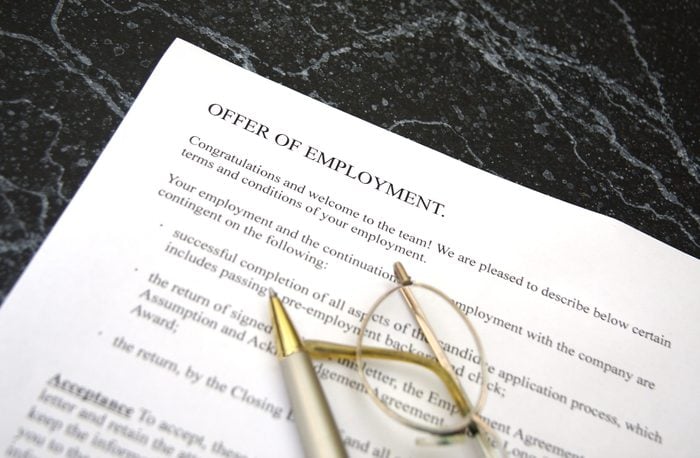
Job-hunting mistakes that take you out of the running
During my 12 years as a hiring manager, I’ve seen just about every mistake job applicants can make. I’m talking everything from candidates overselling their skills to having emotional outbursts during an interview to trying to use someone else’s résumé. (Yes, really.) But most times, it’s the subtle mistakes that trip people up, and that’s often about how you present yourself on your résumé or in a first meeting, as well as how you handle tricky interview questions. Here are some interviewer red flags, which are your sign to run as fast as possible. This is true of tech jobs, service jobs and everything in between.
If you’re reading this, you’re probably wondering, Why am I not getting hired? Well, I have a few ideas—and know how to fix them. While most of these mistakes aren’t deal-breakers in and of themselves (except lying, which is almost always a game-ender), they can make the difference between getting an interview and getting cut, especially in a tight job market. Some of them are also bad work habits that you should stop doing in your current job too. Whether you’re looking for a better job or you want to change careers, here’s what you need to know to stand out in the right way.
Get Reader’s Digest’s Read Up newsletter for more career tips, humor, cleaning, travel, tech and fun facts all week long.

Not tweaking your résumé for the job
This is the most common mistake I see, and hiring intel 101 when it comes to why you’re not getting hired. Gone are the days when you could use a generic résumé and send it out to multiple companies. Thanks to automated hiring software and recruiters looking for very specific skill sets, having a mismatch between your résumé and the job description can be an automatic cut, even before a human being sets eyes on your résumé. This means that unless you’re using the right keywords in the right contexts, you might not even get a chance to interview. I’ve seen this happen to some great candidates.
What to do instead: Take a few minutes to customize your résumé and cover letter before applying. Read the job description carefully, and then make sure you’re listing the skills noted, with the same industry words and titles noted. For instance, if they are looking for a “software engineer,” don’t write “software programmer,” even if you think the jobs are essentially the same thing.
Another issue I see a lot is not being specific in your accreditations or skills. Here’s one example: When a job description says the company is looking for “JavaScript” programmers and people put “Java” on their résumé. Those are not the same.

Using an AI-written cover letter
Writing is a function of many jobs, and your cover letter shows how well you communicate through the written word—emphasis on your. Thanks to Chat GPT and other artificial intelligence (AI) language programs, it’s becoming a popular trend to have a bot write a top-notch cover letter. But this is disingenuous and may backfire. As a hiring manager, I want to see how you really write.
Sometimes we can tell right away that you’ve used AI here: Chatbots are notoriously bland and reuse similar sentences, words and structures. Some hiring managers will even copy and paste the text into Chat GPT and ask the AI if it wrote this cover letter—and it will tell you if it did! Or we might figure this out later. During the interview process, I may notice that your written communication skills in emails don’t match the skill level in your cover letter.
But even if we don’t catch it, you’re setting yourself up for failure. As a candidate, you wouldn’t want to get hired for a job that you wouldn’t be able to do well, right?
What to do instead: Write a cover letter specific to that company and that job listing. Of course you can use spelling or grammar check—and you definitely should—but use your own words and structure. If writing isn’t your strong suit, it’s fine to say that, and that’s something we can discuss if it’s not a major part of the job. I’d much rather know what skills you really have, right from the beginning. And it should go without saying, but don’t use another human to write your cover letter either!

Fudging your skills or experience
There was a funny example a few years ago of an employer asking for “six years minimum experience” of a software language … that had only been around for three years. Sometimes it seems like employers are looking for a unicorn employee that doesn’t exist, so it’s understandable why you might want to fudge your experience or competency and then sort it out after you get the job. Don’t do that. And you should never lie or make up items on your résumé. Whether you’re faking a degree or certification or you made up a reference, we will likely catch it during our background check, and you’ll be automatically disqualified.
Thanks to the internet, it’s pretty easy to catch these kinds of lies. And if someone is exaggerating their competency, it becomes apparent fairly quickly in the interview process, especially if the interview involves any kind of tech screening. In fact, this is why most companies put the tech screening first—to weed out people without the necessary skill set.
I value honesty and being able to accurately evaluate yourself far more than I do any individual skill. Skills we can teach. Honesty, not so much.
What to do instead: One of the best job-interview tips I can give you is to be honest about what you can and can’t do. I love when candidates tell me: “I don’t know that yet, but I’d love to learn.” In the meantime, you can also do a little career cushioning by learning new skills that make you more marketable.

Showing up without a scheduled interview
There’s a popular job-hunting “tip” that makes the rounds every few years, telling people it’s better to deliver your résumé in person. According to the tip, this allows the hiring manager to put a face to the name and shows initiative. This is not a good idea, and chances are you won’t make it past the front desk anyhow. Similarly, don’t call the hiring manager directly unless told to. Hiring managers are very busy, and anything you do that goes outside our hiring protocols is going to be unhelpful at best—and at worst, it will get your résumé dropped straight in the trash.
What to do instead: Follow the hiring protocols and process outlined by the company or the recruiter. I know it can feel tedious, but showing us you can read, understand and follow the rules makes a good first impression. If you’re working with a talent-acquisition company (like a headhunter), then ask them lots of questions. This is what they’re there for, and they should know all the ins and outs of the hiring process for that specific job.

Not editing your résumé and cover letter
A few grammar and spelling mistakes aren’t the biggest deal, but if it comes down to a candidate with a polished résumé and an equally qualified candidate with an error-ridden one, the job will go to the one who took the time to edit. It’s also important to note that good editing goes beyond the basics of spelling.
Once, I was interviewing for a top management position and had two really solid candidates. While both interviewed well in person, the second person’s résumé was not formatted well—lots of dense text with no spacing, making it difficult to read. It ended up being a deal-breaker, because the first candidate’s résumé showed an attention to detail that the second person didn’t have. I wouldn’t have used that as the deciding factor if the second person had a stronger skill set, but when candidates are equally matched, it’s the little things that make the difference.
What to do instead: No one can see their own mistakes, so it’s important to ask a friend, mentor or recruiter (if you’re working with one) to read your résumé and cover letter. At the very minimum, run a quick spelling and grammar check. The software is everywhere these days, so there’s no excuse not to use it.

Using the computer mic in online interviews
Zoom interviewing is a wonderful convenience for both parties, but it does open up a whole new realm of possibilities to inadvertently shoot yourself in the foot. That might be forgetting you have a ridiculous filter turned on (remember the lawyer who appeared as a cat in a court meeting?) or the setup isn’t working correctly and we can’t see or hear you well. Many people don’t realize this, but Zoom picks up ambient noises and amplifies them. I’ve had plenty of interviews where the person is using the computer mic, and all I can hear is the fan noise from their computer or clicking from the keyboard or mouse. Another common mistake: people setting themselves up in front of a window, which essentially blacks out their face and makes it difficult to see their facial expressions.
All these are incredibly distracting to the interview process, and trying to resolve them takes up precious interview time. Plus, if the job relies heavily on online communication, it may make me doubt your ability to use it competently.
What to do instead: Always use a separate mic or headset—don’t rely on the one on your computer—and invest in one with good sound quality. And before the interview, do a test run with a friend on Zoom to check your setup, making sure the lighting, noise and angles are all OK. This is one of the newer interviewing tips, and you shouldn’t ignore it.

Not talking to your references before listing them
People sometimes think that having references—generally one or two professional contacts, a previous boss and a personal friend—is just a formality. Having good references is important, though, as they give us important information about your personality, work ethic, values and history. We do absolutely call them as part of the pre-hiring background check. But if I call your reference and they don’t have anything nice to say about you, they don’t remember or know you or—worse—they mention some of your shortcomings, this could definitely be the reason you’re not getting hired.
What to do instead: Talk to your references first, and check that they feel good about recommending you. Is this someone who is going to speak highly of you and brag about you? Do you know them well and know how they feel about you? If so, list them, and if not, find someone else. And one more important point: Make sure all their contact information is accurate.

Letting your nerves overwhelm you
You’ve made it through all the hoops, and you’ve got your face-to-face (or Zoom-to-face) interview scheduled—hooray! It’s normal to be nervous, but don’t let anxiety completely derail you. Yes, we want to hear your answers to our questions, but even more, we’re looking for whether you’re a good fit for the culture of the job. That will depend a lot on your personality.
This problem can manifest itself in a few ways. Sometimes a candidate will tell a lot of jokes, using humor to diffuse their discomfort, but then they end up not answering my questions, and I’m not sure what to take seriously. On the opposite end of the spectrum, sometimes people come across as stiff and aloof because they’re worried about making a mistake. While I do understand basic nerves, if I’m hiring for a position that involves working with customers, I want to see that you can push through the discomfort of speaking with strangers and still be personable.
What to do instead: Take a deep breath, and try to relax. Know that we want to get to know you. Be the best version of yourself. Let your personality shine through. And if you make a mistake, just own it. I had one candidate who told me: “I was so nervous, I spilled coffee on my shirt on the way over, and now I look like a mess.” Which is a very human thing to do! So we ended up having a nice chat about how we’ve all been there, and the interview went great, even with that less-than-ideal start.

Not preparing properly
You should never show up for an interview without doing a little bit of research first. This means researching everything from the company to the specific position to the location of the interview. The ideal candidate will show up 10 minutes early and be prepared with basic knowledge about what the company is and what we do, a memory of the job description and some questions for me. Not doing this makes you look green at best and lazy at worst.
For instance, let’s say I ask how you feel about international business travel and you answer, “Oh, where are the international offices, and what do you do there?” That’s not a good look. Another issue is at the end of the interview when I ask, “Any questions for me?” and people can’t think of any. You should come prepared with questions for me—whether it’s about the responsibilities, the benefits, the time frame of when we’re making a decision or whatever else.
What to do instead: Take 30 minutes to read up on the company, and reread the job description. Scope out where the building is located so you don’t get lost, and set alarms for when to leave so you’re not late. Figure out your parking. Get your interview clothes pressed and laid out. Practice answering interview questions, and come up with a list of three to five questions for me. If you’re working with a headhunter, recruiter or talent-acquisition team, they’ll be able to answer a lot of your questions and help you know exactly how to get prepared.
The bottom line? Preparation is the difference between a great interview and feeling flustered and frustrated.

BS’ing your answers
Don’t know the answer to one of my questions? The temptation is strong to make something up and throw in some fancy-sounding words that aren’t very specific to make it appear that you know what you’re talking about. As a hiring manager, I see right through this immediately. I’ve learned that the longer a candidate rambles about a topic, the less they likely understand it. Combine rambling with meaningless business-speak words such as optimization, synergistic, core buy-in, empowerment, change focused and the like, and it becomes clear that they’re just trying to deflect from their knowledge gap. People who really know their stuff should be able to explain it quickly and clearly.
What to do instead: Practice answering questions in a succinct way. If you don’t know something, be honest about that. Say something like: “I’ve had experience with X that I’d love to tell you about, but I’m not as familiar with XYZ. However, it’s something I’d be interested in learning more about.”

Missing cues that you’re talking too much
It’s rare that candidates speak too little (although that can happen). It’s far more common that candidates will ramble on excessively when answering questions in an interview. Whether it’s due to nerves or trying to BS your way through an answer, talking too much makes a bad impression and can be very irritating to the hiring manager. This means we’ve gotten good at giving people cues to be more succinct. Pay attention to phrases like: “Answer in two to three sentences,” “We have 10 minutes left together” and “I have a hard stop at noon.”
What to do instead: Answer every question you are asked, but be succinct and positive. Do not waste time complaining about your previous employer or other life circumstances. If you do find yourself rambling, don’t stress about it, but do take a breath and think about exactly what you want to convey—then answer.

Not responding within one business day
Hiring managers know that it takes time to set up interviews, submit paperwork, complete screenings and so forth, and we know you might not be able to respond to our email or voicemail immediately, especially if you’re currently employed. But taking too much time to answer makes it look like you’re not really interested in the job.
What to do instead: Try to respond within 24 hours to any communication. Even if you’re just telling us, “Thank you for your message! I got it, and I’ll be back in touch by XYZ date.” If it’s over a weekend, it’s OK to take another day or two to respond during business hours.

Over-negotiating the offer
Negotiating an offer is an art, and most hiring managers expect one round of negotiations to pin down salary, benefits, time off and responsibilities. Not negotiating at all isn’t necessarily a mistake, but it also doesn’t hurt you to try. However, you should know that negotiating too much gets old quickly and may end in getting the offer withdrawn. Ideally, you receive the original offer and send one counter-offer, and the company responds with their last offer. That’s it. If a candidate tries to counter a second time, they will likely be declined and the previous offer will be rescinded.
What to do instead: Limit your counter offers to one, and one only. There are very few circumstances where it is appropriate to negotiate beyond this, and you risk making yourself look difficult to work with. However, if you still feel like the offer isn’t what you need, be clear and specific about what you’re asking for and why you need it. For instance, if parental leave is very important to you and it’s not included in the original offer, ideally you mention it in your one counteroffer. If they come back with an offer that still doesn’t have it, you can respond and tell them what exactly you’d like, perhaps six weeks of paid leave after the birth of a child.

Changing your salary requirements after the interview
During the pre-interview process, the person arranging the interview will ask what salary you’re looking for. At this point, we expect you to offer a range. During the interview, this will likely come up again, and the interviewer will either refer you to the range offered in the job description or ask you for your range. If we don’t bring it up, it’s totally appropriate for you to ask. I understand this moment can feel really awkward, but know that it’s a normal part of the process and you should feel comfortable discussing money with us.
However, once you’ve set that expectation, you need to stick with it. I’ve seen too many job candidates offer a lower salary range and then attempt to make it higher during the negotiation phase of the job offer. For instance, a candidate says they’re looking for $80K to $90K per year and then counters our offer of $90K by asking for $100K. This is incredibly irritating to a hiring manager and can feel like a bait-and-switch. I’ve rescinded offers over this situation.
What to do instead: Give a salary range rather than a specific number, and stick to it. Once you’ve given your range, don’t try to trick the hiring manager after an offer has been made. If you feel like you really do warrant a higher salary, bring that up early in the process. Let the hiring manager know what extras you’re bringing to the table and even what types of things you’d be willing to sacrifice for more money.

Lying about having another offer
Some candidates try to pit companies against each other by saying they have another offer from XYZ company, but if I can beat the offer, they’ll come to my company. This tactic is very common, and it’s OK to use a competitive offer as leverage during negotiations. But that second offer needs to really exist. I’ve seen candidates use a fake offer as a bluff, and then when I tell them we can’t match it and they should accept that offer, they fess up to try to keep my offer. Usually I’ve rescinded the offer by that point, and there’s no going back, even if they apologize. So know that if you don’t really have a second job offer, you risk ending up with no job offers at all.
What to do instead: Be honest about your needs and wants. We want to know! A big part of what hiring managers do is making sure the candidate is a good match for the job and the company. Playing games makes you look disingenuous.

Asking for feedback after a rejection
Why didn’t I get hired? It’s totally normal to want to know the answer to this question, and I always understand when people ask for feedback. After all, you’re trying to improve and learn, and I appreciate that! Unfortunately, no hiring manager will ever give you real feedback. Telling you why you weren’t hired opens us up to a host of legal problems, and every HR person out there will advise the hiring manager to just not get into it. That’s why rejection letters are so formulaic—we’re covering our butts legally.
What to do instead: If you’d still like to work with that company and be considered in the future for other positions, don’t ask for feedback or why they didn’t hire you. If you’re getting consistently rejected, talk to a recruiter, headhunter, mentor or hiring-manager friend for advice. Do not ask the person you last interviewed with.

Thinking that a rejection is the end of the line
Why is what you do after getting rejected for a job so important? After all, you didn’t get the job, so who cares what they think of you, right? Not so. This door may be closed, but that doesn’t mean every door will be closed there forever. In fact, maintaining good relations with a company’s talent-acquisition team can keep you on the short list for future opportunities—both with this company and others that the hiring manager or talent-acquisition team may work for.
Believe me, we are paying attention to how you handle the rejection! There have been plenty of people who were not a good fit for the job they originally applied to, but I liked them enough to reach out in the future when a better fit opened up. Or sometimes our first-choice candidate turns down the offer and we’ll then turn to you—but only if you’ve been polite and professional. It’s OK to be disappointed and to express that, but venting your frustrations to the interviewer won’t make them rethink their decision to not hire you and will likely reinforce it.
What to do instead: Say, “I’m disappointed I didn’t get the job, but I appreciate the opportunity. Thank you for your time. Please keep me in mind if something opens up in the future.” No swearing, name calling, door slamming or threats. (And yes, I’ve seen all those things happen.) Even better: Follow up that statement with a nice thank-you note after the interview. Stay hopeful and positive, and keep an eye out for other potential openings. If you’ve written a nice thank-you letter, the hiring manager may even stay in contact with you.